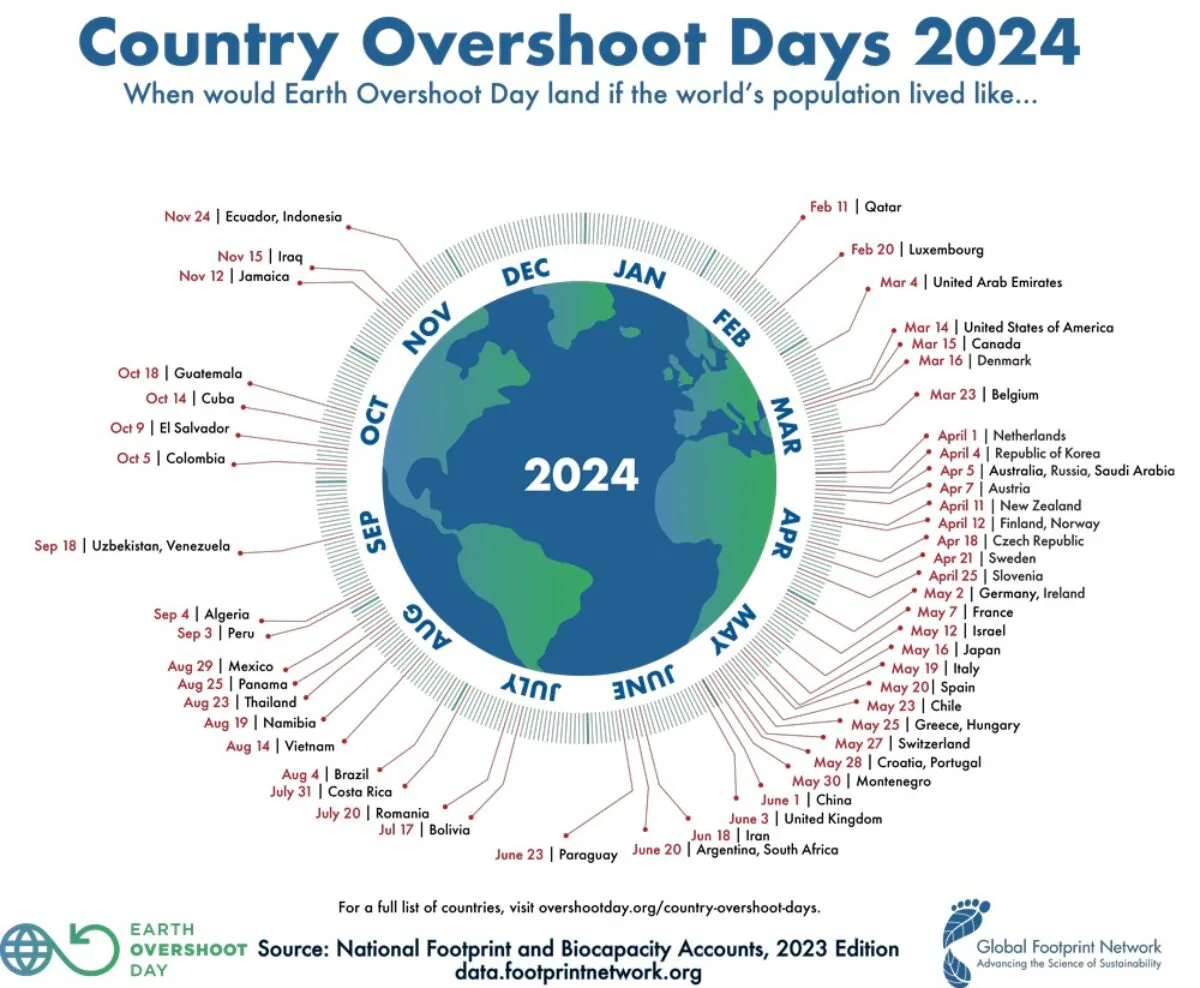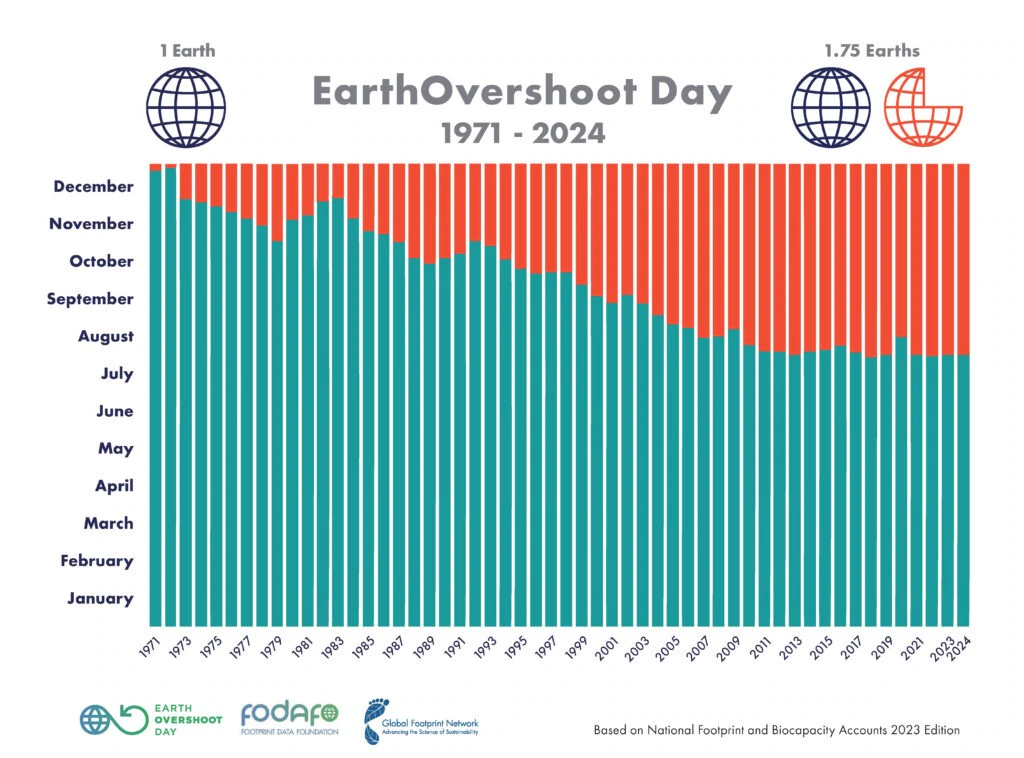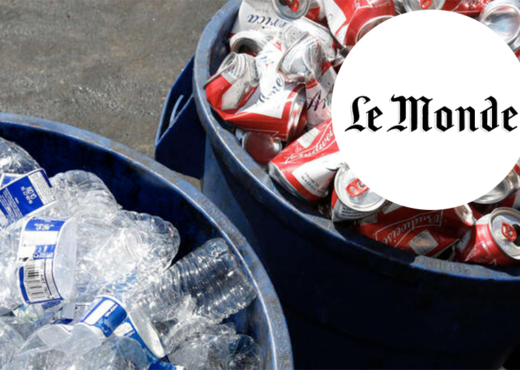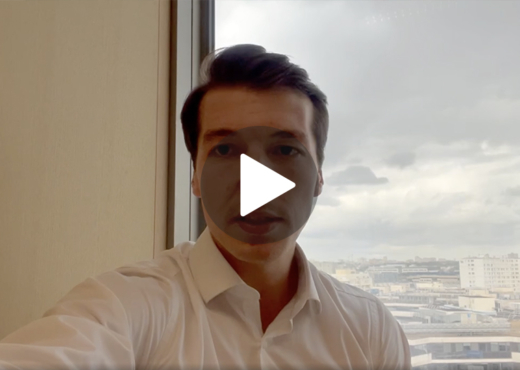
Earth Overshoot Day: let’s make the planet the next gold medallist
Yesterday, Thursday 1st of August 2024 was Earth Overshoot Day. This date marks when the humanity has used in a year all the biological resources that the Earth can regenerate during that given year.
Why does it matter? We live in a wasteful economy that poorly use natural resources and materials. This leads to multiple undesirable outcomes on the physical limits of our planet such as: resource scarcity, pollution on lands and oceans, biodiversity loss, GHG emissions, etc.
• Resource scarcity: As we consume the equivalent of 1.75 Planet a year, we will inevitably experience resource scarcity if no action is taken. And mismanaging our resources will be particularly alarming to secure our net zero trajectory since the production of renewables mainly rely on critical raw materials (copper, cobalt, nickel…).
• Oceans and lands pollution: According to Earth Action, 43% of all plastic waste generated is mismanaged, which represents 68.5 million tonnes of plastic this year alone. As we pollute the biodiversity, particles of microplastics are now found in human bodies for our food impacting directly our health. With forecast stating that plastic production is set to double by 2040, more efforts must be made on managing waste in general.

To overcome this challenge, we need to become circular economy champions! The circularity fosters the creation of new value chains that aim at optimizing the use of resources and minimizing the production of pollution and waste via three main principles: Reduce, Reuse, Recycle. The race towards this new paradigm has already started for a healthier production and consumption model, business resilience and sovereignty.

First of all, the organisation of the Paris Olympics was planned to achieve carbon neutrality by halving GHG emissions and offsetting any residual emission through many initiatives that are developed with circularity at the core (e.g., any infrastructure built will be either disassemble or have a second life). Beyond this, it is also the opportunity to attend major events and learn from outstanding athletes. Here are my four learnings from watching the Olympics that could support a systemic change:
• Set a clear target and keep focusing on it: Pauline Ferrand-Prévot, arguably one of the best cross-country cyclists of all time, had never won any medal after three Olympic participations. Being an Olympic champion on her forth attempt in Paris was part of her mission statement, making her prep for the race of her life over the past four years. As a company, it means that extra-financial targets must be part of a long-term vision. Transitioning to circular models took between 10-20 years for companies like Interface or SEB.
• Build the journey that enables to reach the destination: When entering the process to qualify and compete for the Olympics, all athletes structure a training plan with intermediary milestones. To not give room to any mistake during the race, they are obsessed with winning, are consistent in the effort, and accept that failure is part of the process. In a business environment that is increasingly uncertain, companies are urged to steer the trajectory towards the overarching target with constant investments in the right pools of value. Sustainable products won’t all be successful from day one, but they will contribute to change consumer habits, support innovation and grow the market size.
• Compete alone, succeed together: If you refer to Leon Marchand’s latest interview (the sensational French swimmer and multiple gold medallist), he claims that none of his performances would have been possible without the coaches he’s been working with. After each race, records and medals were individual, but celebrations were all collective. High performing teams know that each member has its role to play (product engineers, designers, circular SMEs, etc.). So, having the right skills and a sense of belongingness are essential, no matter the nature of the project.
• The bigger obstacle is in your head: Who could tell that Antoine Dupont, world best rugby fifteens player, would be eligible to play and win the Olympics rugby sevens? To achieve that, Antoine Dupont and rugby federations were not afraid to take risks, so that the player could train and compete with the French rugby sevens team before the official season ended. Therefore, regardless of the challenge, thinking that it is possible is the starting point to any transformation. This culture of change must be embodied by leaders and communicated to each person in the organization. It is essential to have circular economy ambassadors that bring this thinking into action, bridging the ‘what’ and the ‘how’.
Many solutions to operate the circular economy already exist, giving the opportunity to delay Earth Overshoot Day during the next years and make the planet the next gold medallist. Like Mark Twain said: « They did not know it was impossible, so they did it ».


